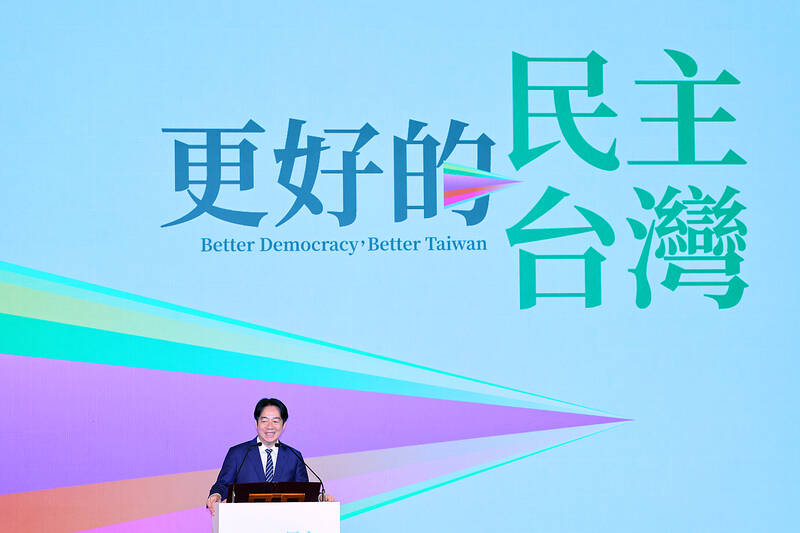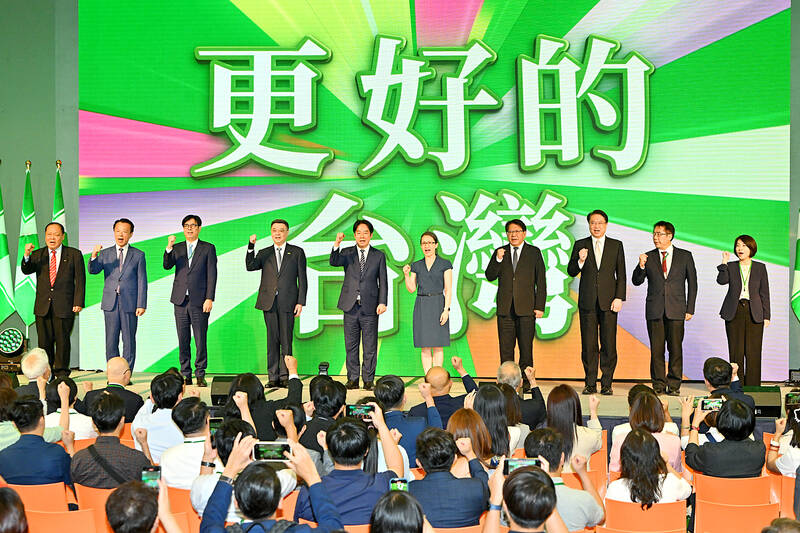The Democratic Progressive Party (DPP) must align with citizens in their mass recall movement to safeguard the country, President William Lai (賴清德) said at the party’s national congress yesterday in his capacity as party chairman.
At the party congress, themed “Better democracy, better Taiwan,” Lai said the biggest challenge of domestic politics was in the legislature, as the opposition, which holds a majority, conducted legislative meetings without following procedure, passed bills that contradicted the Constitution, and undermined government operations and national development by slashing the central government’s budgets.
Beijing has been using influence warfare and military intimidation against Taiwan, and regards the annexation of Taiwan as part of its policy to achieve “the great rejuvenation of the Chinese nation,” he said.

Photo: Tien Yu-hua, Taipei Times
It also intends to annex the nation as part of its attempt to expand its hegemony across the western Pacific, with the ultimate goal of reshaping the rules-based international order, Lai said.
That would not change simply because Taiwan changes its governing party or head of state, he added.
The power of civil society is indispensable to building better democratic mechanisms and a better Taiwan, Lai said, adding that the nation’s vibrant democracy would not have existed were it not for strong civic forces.

Photo: Tien Yu-hua, Taipei Times
For many years, there has been a latent, invaluable strength rooted in Taiwanese society that would be brought out whenever the country is in urgent need, Lai said.
For example, the Wild Lily movement of 1990 called for reform and democratization, and people in the Sunflower movement of 2014 gathered to stop the passage of the Cross-Strait Service Trade Agreement and prevent Taiwan from steering toward a pro-China course, Lai said.
The DPP stood by the people, the consensus of society, in such civic movements, in a collective effort to defend Taiwan’s sovereignty and democracy, he said.
While many countries have become vigilant of Chinese hegemonic expansion, Taiwan’s opposition parties have blocked national defense budgets and national security bills proposed by the government, Lai said.
In response, Taiwanese, concerned about the nation’s existence, unleashed their civic strength again through the “Bluebird movement” and mass recall movements, so the DPP must stand by the people and safeguard the country, he said.
The “Bluebird movement” refers to the people who protested against opposition lawmakers outside the Legislative Yuan last year.
National self-defense and economic development are key to building a better Taiwan, Lai said.
Given that China would exploit Taiwan’s inclusion of diversity for its “united front” and infiltration tactics, an all-out national defense system must be constructed to counteract its mischief, he said.
National defense capabilities must continue to be enhanced through arms procurement, and private military research and development to bolster national defense autonomy amid increasing Chinese military coercion, he added.
On economic development, the advanced technology and innovation capacity of Taiwan should be leveraged to improve the domestic investment environment and attract more foreign investments, Lai said.
The fruits of economic development should also be shared among all people of Taiwan to fulfill balanced regional developments and intergenerational justice, he added.

CHAOS: Iranians took to the streets playing celebratory music after reports of Khamenei’s death on Saturday, while mourners also gathered in Tehran yesterday Iranian Supreme Leader Ayatollah Ali Khamenei was killed in a major attack on Iran launched by Israel and the US, throwing the future of the Islamic republic into doubt and raising the risk of regional instability. Iranian state television and the state-run IRNA news agency announced the 86-year-old’s death early yesterday. US President Donald Trump said it gave Iranians their “greatest chance” to “take back” their country. The announcements came after a joint US and Israeli aerial bombardment that targeted Iranian military and governmental sites. Trump said the “heavy and pinpoint bombing” would continue through the week or as long

TRUST: The KMT said it respected the US’ timing and considerations, and hoped it would continue to honor its commitments to helping Taiwan bolster its defenses and deterrence US President Donald Trump is delaying a multibillion-dollar arms sale to Taiwan to ensure his visit to Beijing is successful, a New York Times report said. The weapons sales package has stalled in the US Department of State, the report said, citing US officials it did not identify. The White House has told agencies not to push forward ahead of Trump’s meeting with Chinese President Xi Jinping (習近平), it said. The two last month held a phone call to discuss trade and geopolitical flashpoints ahead of the summit. Xi raised the Taiwan issue and urged the US to handle arms sales to

BIG SPENDERS: Foreign investors bought the most Taiwan equities since 2005, signaling confidence that an AI boom would continue to benefit chipmakers Taiwan Semiconductor Manufacturing Co’s (TSMC, 台積電) market capitalization swelled to US$2 trillion for the first time following a 4.25 percent rally in its American depositary receipts (ADR) overnight, putting the world’s biggest contract chipmaker sixth on the list of the world’s biggest companies by market capitalization, just behind Amazon.com Inc. The site CompaniesMarketcap.com ranked TSMC ahead of Saudi Aramco and Meta Platforms Inc. The Taiwanese company’s ADRs on Tuesday surged to US$385.75 on the New York Stock Exchange, as strong demand for artificial intelligence (AI) applications led to chip supply constraints and boost revenue growth to record-breaking levels. Each TSMC ADR represents

Pro-democracy media tycoon Jimmy Lai’s (黎智英) fraud conviction and prison sentence were yesterday overturned by a Hong Kong court, in a surprise legal decision that comes soon after Lai was jailed for 20 years on a separate national security charge. Judges Jeremy Poon (潘兆初), Anthea Pang (彭寶琴) and Derek Pang (彭偉昌) said in the judgement that they allowed the appeal from Lai, and another defendant in the case, to proceed, as a lower court judge had “erred.” “The Court of Appeal gave them leave to appeal against their conviction, allowed their appeals, quashed the convictions and set aside the sentences,” the judges